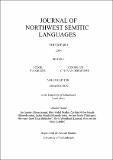Files in this item
"A barley cake" (Ezek 4:12a) : syntax and redaction
Item metadata
| dc.contributor.author | Lyons, Michael Alan | |
| dc.date.accessioned | 2018-09-06T10:30:06Z | |
| dc.date.available | 2018-09-06T10:30:06Z | |
| dc.date.issued | 2014 | |
| dc.identifier | 255732659 | |
| dc.identifier | 119edcd6-a671-4cfe-8aad-8945c240254b | |
| dc.identifier.citation | Lyons , M A 2014 , ' "A barley cake" (Ezek 4:12a) : syntax and redaction ' , Journal of Northwest Semitic Languages , vol. 40 , no. 1 , pp. 79-92 . < http://hdl.handle.net/10520/EJC158535 > | en |
| dc.identifier.other | ORCID: /0000-0003-2940-3965/work/60888313 | |
| dc.identifier.uri | https://hdl.handle.net/10023/15978 | |
| dc.description.abstract | Most commentators and translators have analysed Ezek 4:12a as a construction containing a pre-verbal noun phrase functioning as an adverbial: "And, as a barley cake, you shall eat it". Most commentators have then argued that vv. 12-15 are a redactional extension of v. 9 or v. 10 - even though these verses contain no feminine antecedent for the pronominal suffix in v. 12a. In this essay, I argue that Ezek 4:12a should be analysed as a front (left) dislocation construction. Ezek 4:12-15 represents an independent symbolic act that has been redactionally inserted into the present context, and the function of the dislocation construction is to make the referent "barley cake" more highly available for cognitive processing. | |
| dc.format.extent | 1939166 | |
| dc.language.iso | eng | |
| dc.relation.ispartof | Journal of Northwest Semitic Languages | en |
| dc.subject | BS The Bible | en |
| dc.subject.lcc | BS | en |
| dc.title | "A barley cake" (Ezek 4:12a) : syntax and redaction | en |
| dc.type | Journal article | en |
| dc.contributor.institution | University of St Andrews. School of Divinity | en |
| dc.description.status | Peer reviewed | en |
| dc.identifier.url | http://hdl.handle.net/10520/EJC158535 | en |
This item appears in the following Collection(s)
Items in the St Andrews Research Repository are protected by copyright, with all rights reserved, unless otherwise indicated.

